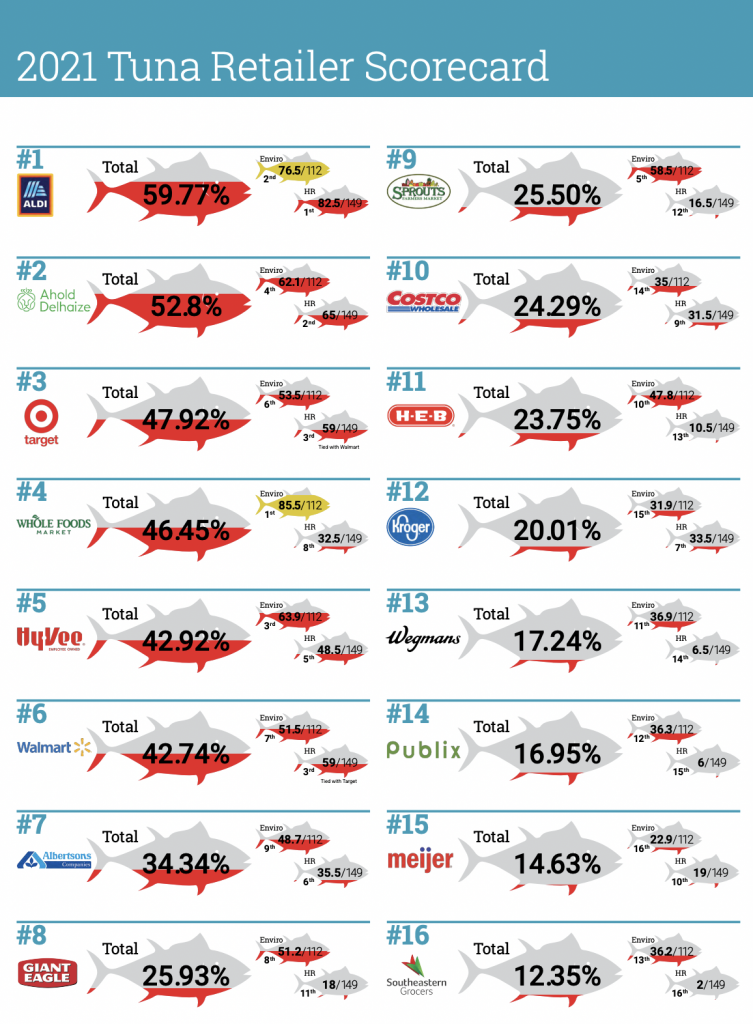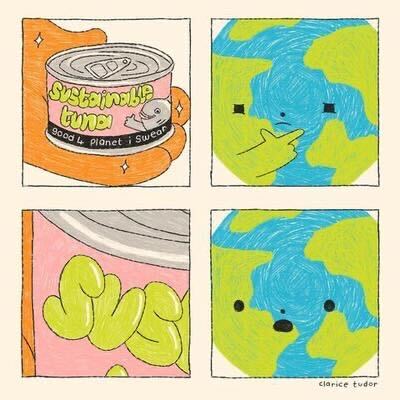Global seafood supply chains are “notoriously opaque,” leaving the door open for environmental and human right abuses.

Rainbow Warrior travels in the Pacific to expose out of control tuna fisheries. Tuna fishing has been linked to shark finning, overfishing and human rights abuses.
Global seafood supply chains are “notoriously opaque”, leaving the door open for environmental and human right abuses. It’s time for major US brands and retailers to increase transparency and traceability in their seafood supply chains.
Grocery shopping. A chore some of us love. Others… not so much. I usually go in prepared. List in hand and an overly optimistic meal plan of all the wonderful, healthy, delicious meals that I will be making for my family. I browse each aisle inspecting each package. Calorie count. Sodium levels. Artificial sweetener and sugars. Unpronounceable chemicals and preservatives that I try to steer clear of. I like to think that I do a pretty fair job of buying the best and healthiest available for my family.
Because of its versatility, tuna is a quick and easy staple in most households. But as a fisheries campaigner, I spend way more time poring over the details on these cans than your average customer. What am I looking for amongst the rows and rows of tins? Of course, flavor and seasoning, nutritional content and all that matters. But I also think of all the ways the can of tuna in my hand came to be.

You see, what they don’t tell you on the ingredients list is that tuna supply chains are infamous for forced labor issues. Migrant fishers may spend months at sea harvesting fish in dangerous and sometimes deadly conditions. Stories of them being overworked and denied their meager pay are all too common. Add to this mix the wildly destructive practices involved in high seas commercial fishing and we’ve got a recipe for disaster. This horrible concoction of human rights abuses and environmental destruction are part of the supply chain that allows your favorite retailer to offer tuna at seemingly bargain prices. At this point, that can of tuna is probably not looking so great.
Most of us can relate to the feeling of being overwhelmed as we try our best to be informed and ethical consumers. And it is with good reason. In recent years, the public has become increasingly aware of these issues in a range of supply chains – from apparel to fisheries. As awareness grows, so do calls for responsibility and accountability. A recent poll of American consumers found that 80% of the respondents expected stores and restaurants to ensure that the seafood they sell is legally caught and with no human rights or labor violations. Retailers and manufactures know this. So the labels promising environmental sustainability are meant to reassure us that all is well.
The question then becomes, can we truly trust them? Unfortunately, the answer is not a simple yes or no. Global seafood supply chains, particularly tuna supply chains, are notoriously complex and opaque. Fish could be caught anywhere in the oceans. Then they are hauled by fishers from developing nations on ships owned by companies from middle-income nations, processed in a wholly different nation, and then finally packaged and sold to us in the grocery stores of the world’s richest nations. Before it hits the shelf, the tuna in a single can could have passed through several different companies.

© Clarice Tudor
The incredibly complex seafood supply chain lends itself to opacity, and the brands and retailers who make a lion’s share of the profit in this market don’t do much to make this better. Most of them treat supplier information as confidential, making it almost impossible to know where your fish came from, how it was caught, and who caught it. This leaves the door open not only for horrible labor practices to continue, but also for illegally caught fish to find its way into otherwise legitimate supply chains.
In Greenpeace’s 2021 report, “The High Cost of Cheap Tuna: US Supermarkets, Sustainability, and Human Rights at Sea,” three-quarters of the 16 retailers surveyed claimed to be able to trace at least 90-99 percent of their tuna back to the vessel that caught it. Despite this, only one – Hy-Vee – committed to publicly releasing this information. Hy-Vee followed through on this commitment recently, with the publication of their private label tuna supplier vessel documentation report. This publicly available report provided a list of vessels that caught Hy-Vee’s private label tuna in the last six months of 2021. However, citing brands’ practices of treating this information as confidential, Hy-Vee was only able to share this information for their private label tuna, rather than the national brands from which it buys such as Starkist and Chicken of the Sea.
In recent years, as the pressure from environmental and human rights groups to disclose this information has mounted, many of the major national brands of tuna such as Bumble Bee and Chicken of the Sea have initiated “trace my fish” programs. Through these programs, instead of simply disclosing a list of all their supplier vessels, brands expect customers to gather product codes from every single can they buy and input these codes on their website to learn where the tuna in that particular can was caught and which fishing vessels supplied it. If this sounds bizarre to you, it’s because it absolutely is. This is not what real transparency looks like. Instead of leaving it up to already overwhelmed consumers to dig out this information, tuna brands should simply disclose a list of all the vessels they supply from. Doing this will allow greater oversight by regulatory agencies and watchdog organizations that can help verify their claims of sustainability and worker’s rights.
Inaction and secrecy by retailers and national brands leave large loopholes for the exploitation of vulnerable migrant workers, the perpetuation of environmentally damaging practices, and the occurrence of illegal, unreported, and unregulated (IUU) fishing. If we want to be sure that the fish we are eating isn’t tainted with environmental and human rights abuses, we need more brands and retailers to follow Hy-Vee’s lead.
It is time for action.
DEMAND THAT Brands like Bumble Bee do more to protect our oceans and workers.
